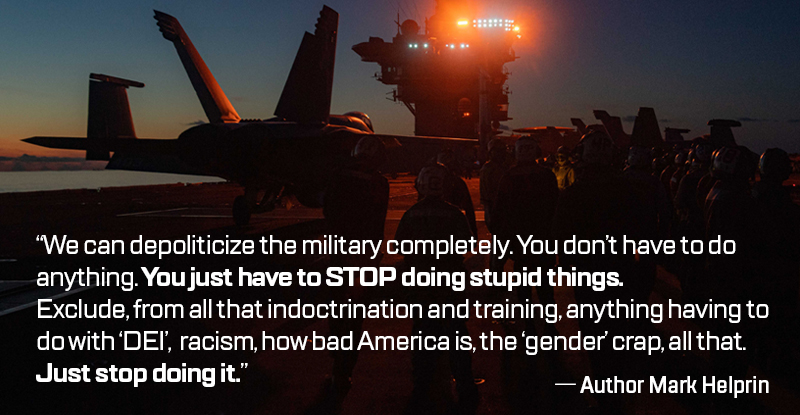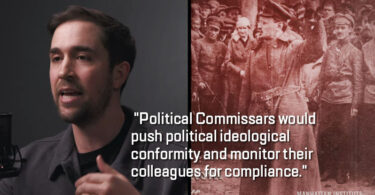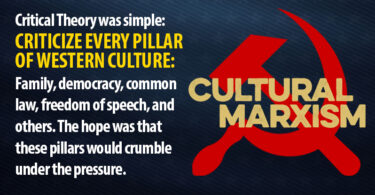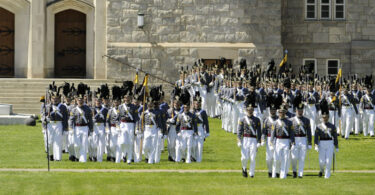Article from the Wall Street Journal, but let’s cut to the chase with this section:
. . . . Why is the number of men willing to fight and die for the United States decreasing?
Mr. Helprin mentions an education system that trains young people to distrust their country and a military bureaucracy enthralled by woke ideology.
So what can we do about that in the short term? Without pausing Mr. Helprin says: “We can depoliticize the military completely.”
That won’t be easy, I say. “It might not be so hard,” he replies.
“You don’t have to do anything. You just have to stop doing stupid things.
The military is a million education programs meant to indoctrinate and train.
Exclude, from all that indoctrination and training, anything having to do with ‘diversity, equity and inclusion’ ”—he signals quotation marks—
anything having to do with racism, anything about how bad America is, the ‘gender’ crap, all that.
Just stop doing it.”
He has a point. An executive order from the commander in chief would likely accomplish for the U.S. military what Gov. Ron DeSantis did by signing legislation banning DEI in Florida public universities.
If the military were to scrap every last shred of DEI training tomorrow, nobody but activist busybodies would regret it, and the benefits would reverberate for a decade. . . . .
Indeed.
Mark Helprin Asks: Are Americans Ready for War? (Wall Street Journal, 3 May 2024)
As our enemies advance, a prescient author considers what it would take for the U.S. to avoid defeat. The answer is sobering.
By Barton Swaim
Free nations prefer peace to war, but that preference is complicated by the continued existence of nations led by criminals, ideologues and irredentists. In a fallen world, war eventually comes, wanted or not.
And it’s coming. Iran and its proxies, having started one war in Israel, don’t appear reluctant to consider another with the U.S. A Russian victory in Ukraine, even a partial one, would make eventual confrontation with the North Atlantic Treaty Organization almost inevitable. China menaces Taiwan. And the possibility that Kim Jong Un isn’t plotting an attack on South Korea—or on the U.S.—is a bet only a fool would take.
These admittedly rather basic reflections occurred to me as I read Mark Helprin’s latest novel, “The Oceans and the Stars.” The book, which went on sale on Oct. 3, relates fictional circumstances that became far easier to credit four days later.
Mr. Helprin’s novel imagines a war launched by Iran against the U.S. and Israel, a political class that views national security exclusively as a means of gaining electoral advantage, a perpetually irritable American president whose chief goal is to avoid blame, and an army of terrorists capable of savagery so repellent that Western elites refuse to contemplate it.
There are other anticipatory details. Mr. Helprin’s story, written between 2019 and 2022, somehow counters the American news media’s outrage over Israel’s inadvertent targeting of World Central Kitchen aid workers in April of this year. The novel’s hero, a U.S. Navy captain, observes that compared with Israel, “we’ve killed vastly many more of our own in friendly fire, thousands actually, yet we find it hard to accept that someone else can do it.”
Last month I visited Mr. Helprin’s home here, some 10 miles north of Charlottesville. On the wall of his vast and spacious library I spy a framed August 1941 photograph of Winston Churchill on the deck of the H.M.S. Prince of Wales, the ship on which the prime minister met FDR to enlist the U.S. in the struggle against fascism.
I came to Earlysville—I say this at the risk of melodrama—to ask Mr. Helprin the sort of question that Churchill had contemplated in the years before that photograph was taken:
Are we ready to fight?
The answer today is plainly no. But neither were the British in 1935.
What does America need to do to get ready?
In Mr. Helprin’s office I indulge my habit of scanning other people’s bookshelves, noting row after row of the U.S. Naval Institute’s Proceedings, Janes Fighting Ships, Strategic Survey and other technical journals one seldom encounters outside university libraries. “I’ve been reading those cover to cover since the 1960s,” he says. No reader of “The Oceans and the Stars,” or of his many essays and op-eds on war and defense, is likely to doubt him.
As we sit down, Mr. Helprin doesn’t wait for me to ask a question. “It might not be a gracious thing to do, but let me begin with an ‘I told you so,’ ” he says. Briefly he catalogues several unheeded warnings he has published over the decades. One of those appeared in these pages under the headline “What to Do About Terrorism, Really,” on May 10, 1995.
The essay urged the Clinton administration to remember, the recent Oklahoma City bombing notwithstanding, that terrorism has always come mainly from abroad and would surely remain that way. Mr. Helprin envisaged a cataclysm brought about by “a few former Soviet tactical warheads in a business jet piloted by a young mullah with a grudge against Sears Roebuck.”
He was slightly off—the cataclysm, when it came six years later, involved four passenger jets rather than a private plane and warheads, and the target was New York and Washington, not Chicago. But he saw something others didn’t.
Any discussion of U.S. leadership abroad has to start, as ours does, with America’s humiliating 2021 retreat from Afghanistan, a colossal exhibition of weakness and confusion and almost certainly a catalyst of Russia’s invasion of Ukraine and Hamas’s attack on Israel.
Our faltering in Europe and the Middle East is the reason, Mr. Helprin says, we need to adopt a “bastion strategy.” Meaning what? “No, we’re not going to give up on a forward defense in Europe and Asia. But as an emergency measure, as a reserve, in case the forward defenses fail—and they are under tremendous pressure now both because of our isolationism and our disintegration and the world situation externally—if those should fail, we have a bastion.”
The bastion is the Western Hemisphere. “Of course I’m talking about the Monroe Doctrine. Essentially, Russia, China and other nations may not interfere in this half of the globe, but we may interfere in theirs.”
Yet Russia, China and Iran are making enormous inroads in South America, “and we can’t allow them to do that. If South America goes, we’re done for. People think we’re protected by the oceans, and we are to an extent. But even so, in the [American] Revolution, when the tiny wooden ships would take a month to cross the Atlantic, it was a closely run thing. The British were still able to transport huge armies and supplies to the United States with that kind of transport.”
Another strategic priority is the protection of Europe. “A lot of people think we should concentrate more heavily on China because China is more powerful than Russia and more of a developing threat. That’s true,” he says. “China is the bigger, more immediate threat.
I think I agree, but I have to ask why Europe is more valuable. “Our economic relationships to the European nations, which are the greatest other than those with Canada and Mexico. Not just trade, but the interplay of science and culture. We are, in so many ways, joined to Europe as we are to nowhere else. Also physically, in terms of a position in Earth’s geography: If the North Atlantic is controlled by hostile powers, if it falls under Russian dominance, then we’re pretty much”—again—“done for.”
I assume that he will get to Taiwan, and he does: “Our strategy there is based on a faulty premise. You know what that premise is?” he asks. I don’t. “If you read all the studies and military journals on defending Taiwan, they all talk about penetrating bombers and missiles and so on to strike Chinese bases. Really? China is a nuclear-armed state, and we’re going to attack Chinese bases on the country’s mainland? . . . That would set up a nuclear standoff. We’re not going to do that.”
Were China to attack Taiwan, Mr. Helprin says, it would present a situation in which China can hit Taiwan because it’s not the U.S., while the U.S. can’t hit China. So what’s the solution? Here Mr. Helprin launches into an explanation at once expansive and detailed, rather like one of his novels. The import: Since the area of operations would be disadvantageously confined to the sea and Taiwan itself, the U.S. will need to harden its Pacific bases against China’s missiles, bombers and special forces; swell its Pacific fleet with ships both large and small (aircraft carriers and attack submarines, but also motor-torpedo boats, mine-sweepers, escort vessels, etc.); boost production of long-range aircraft, manned and unmanned; upgrade its nuclear deterrent; and harden Taiwan to the extent possible.
“I don’t think that we will meet the challenge,” Mr. Helprin says after this catalog, “but with responsible leadership we could. That’s the tragedy. Take a strong horse and give him one weak and clueless rider after another, and pretty soon the horse is no longer strong.”
Perhaps the core of the problem is American policymakers’ fear of risk and attendant accountability. If a U.S. administration tried to mount the sort of defense posture Mr. Helprin counsels, something might go wrong, someone would have to pay a political price, and no one at the moment seems inclined to pay any sort of price for anything.
As soon as I use the phrase “fear of risk” he points out that “in 1940 Churchill sent all the tanks in Britain to North Africa to fight the Germans. That denuded Britain of tanks, and at the time it was still possible that Sea Lion”—Hitler’s plan to invade the U.K.—“could have happened. The British would have had no tanks to use in defense. It was a risk. Churchill took it. War is about risk.”
Our technological superiority, Mr. Helprin thinks, has fooled us into believing that war is about neat, danger-free solutions. “We have been acclimated to situations in which we control everything,” he says. “We completely control the air. We completely control logistics. We have bases to which we can retreat, and on those bases we have McDonald’s.” Mr. Helprin stops himself: “This isn’t to say that individual units and soldiers haven’t fought like hell and suffered. But in terms of the larger picture of war, we haven’t fought for survival in a long time.”
A more fundamental problem than any matter of strategic confusion is the simple matter of recruitment. The country can’t find enough people willing to fight for it.
Here I quote from a passage in Mr. Helprin’s 1991 novel, “A Soldier of the Great War.” The story’s hero, Alessandro, on trial for desertion (he is innocent), correctly points out that although the Italian government can force young men into the field, it needs their “consent” if they’re going to fight. “That’s nonsense,” the judge says.
But of course it isn’t. The U.S., which did away with the draft in 1973, depends for its existence on men willing to fight for it, and recruitment has dropped precipitously in recent years.
Mr. Helprin feels this matter keenly, having, as he puts it, avoided the draft in 1969. He did so legally, having been declared ineligible—“4-F,” in military jargon—as a result of a long childhood sickness. “Something was wrong with my brain,” he says. “There’s a name for it, which I’ve forgotten—something convulsive disorder.” Later he felt he could have gotten around the 4-F designation if he’d wanted to.
Then, in May 1969, he happened to see a funeral for a young soldier who’d been killed in Vietnam. “He was about my age. . . . That’s when I understood that he may have died in my place.” Soon after that Mr. Helprin, who is Jewish and was born in Manhattan, took Israeli citizenship, becoming a dual national; he enlisted in the Jewish state’s military and served for two years. (Several years later he relinquished his Israeli citizenship.)
But back to the 2020s.
Why is the number of men willing to fight and die for the United States decreasing?
Mr. Helprin mentions an education system that trains young people to distrust their country and a military bureaucracy enthralled by woke ideology.
So what can we do about that in the short term?
Without pausing Mr. Helprin says: “We can depoliticize the military completely.”
That won’t be easy, I say. “It might not be so hard,” he replies.
“You don’t have to do anything. You just have to stop doing stupid things.
The military is a million education programs meant to indoctrinate and train.
Exclude, from all that indoctrination and training, anything having to do with ‘diversity, equity and inclusion’ ”—he signals quotation marks—“anything having to do with racism, anything about how bad America is, the ‘gender’ crap, all that.
Just stop doing it.”
He has a point. An executive order from the commander in chief would likely accomplish for the U.S. military what Gov. Ron DeSantis did by signing legislation banning DEI in Florida public universities.
If the military were to scrap every last shred of DEI training tomorrow, nobody but activist busybodies would regret it, and the benefits would reverberate for a decade.
What about the long term?
Very little about today’s cultural landscape suggests that America’s political class and citizenry understand the threats or are prepared to counter them with force.
What’s going to get us ready? “A strong leader on a white horse isn’t going to do it,” Mr. Helprin says. “The only way that can happen, I think, unfortunately, is distress and defeat. A depression, a big loss in a war, invasion, Gotterdammerung.”
He trails off. It’s a solemn thought. “Still,” he says, “there is so much good in this country, so much courage that we may yet summon well steeled resolve.”
Mr. Swaim is a Journal editorial page writer.









Leave a Comment